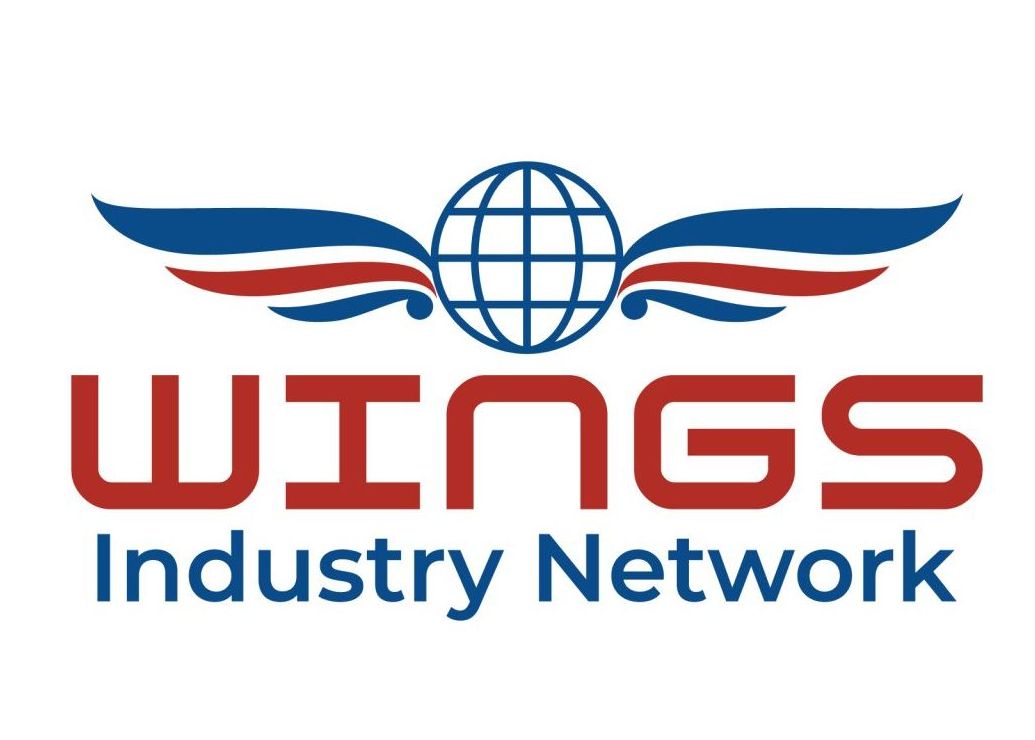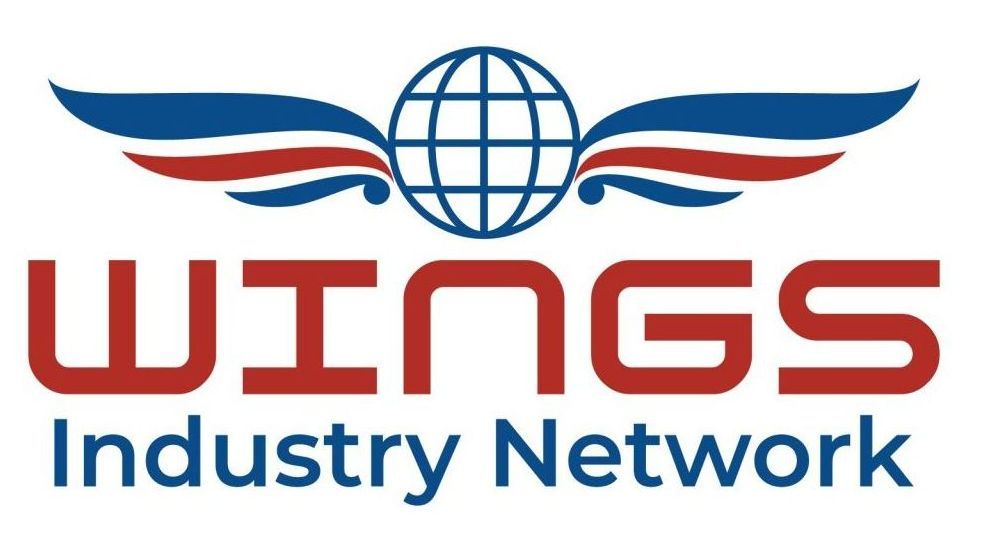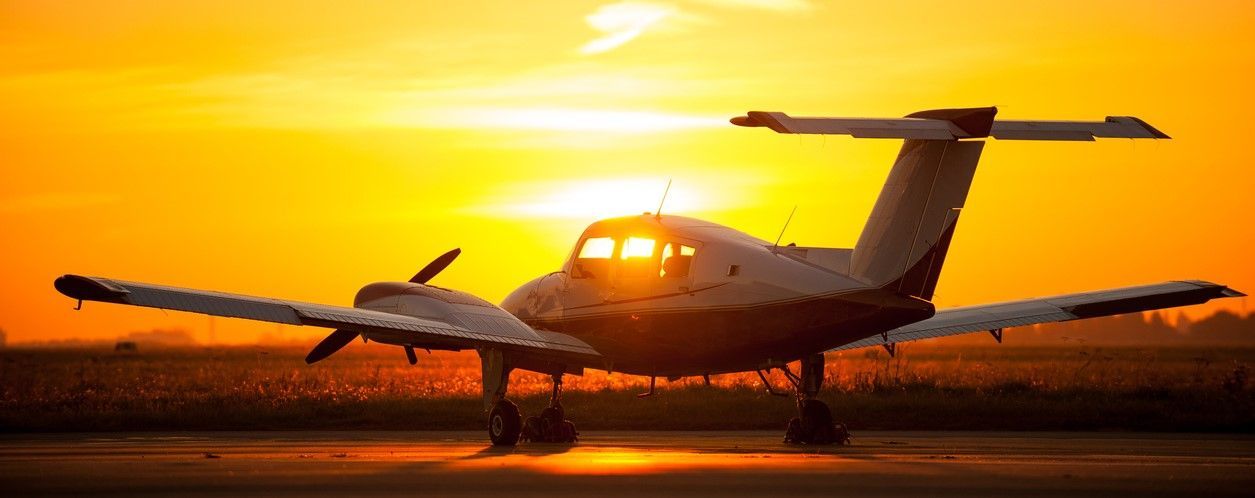
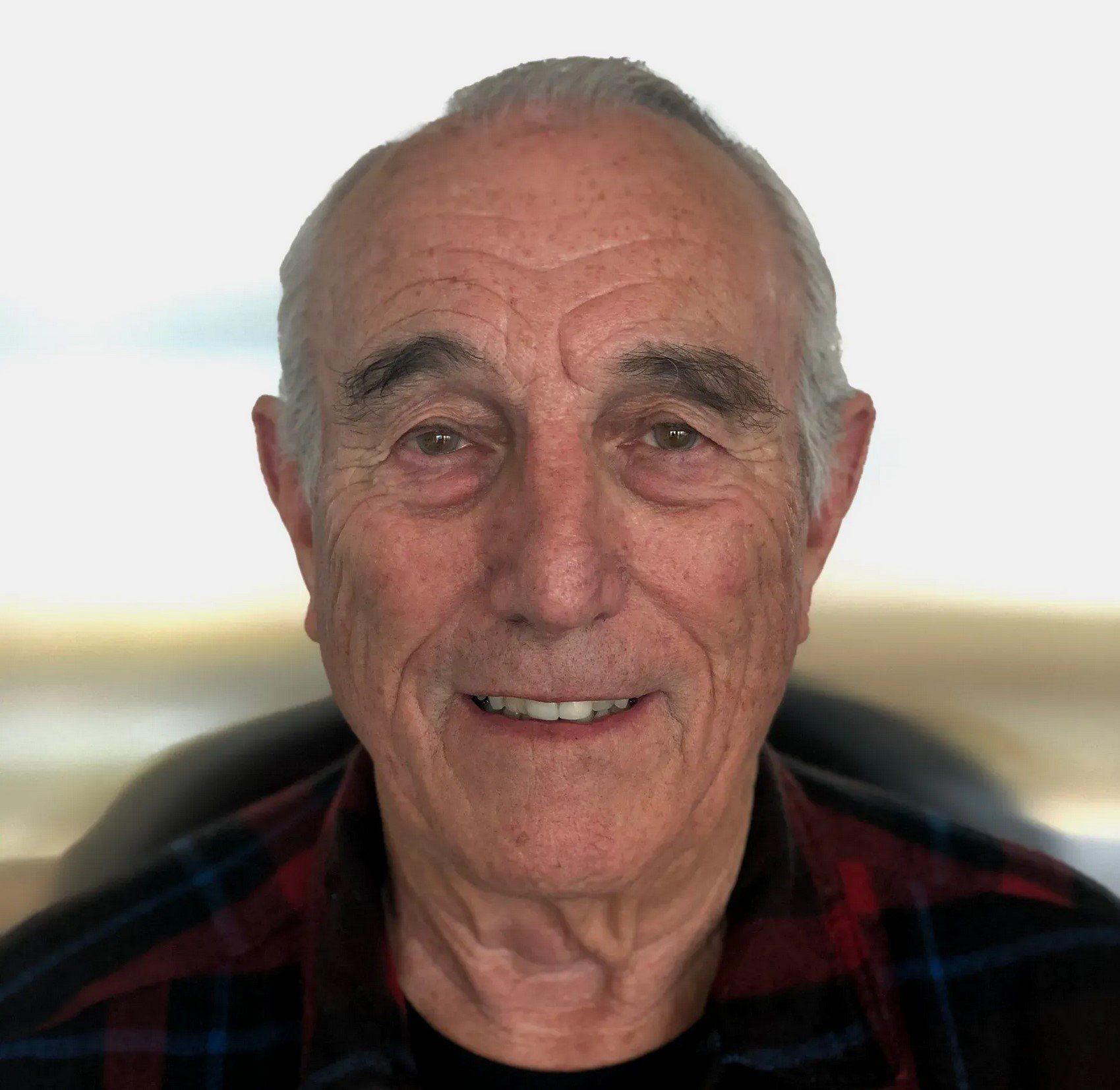
Paul Burger
Paul Burger, general aviation safety philanthropist and 2,500-hour ATP is the founder of the WINGS Industry Advisory Committee, Advocates for Aviation Safety Foundation, and Founding Director of the WINGS Industry Network. He is a member of the AOPA Air Safety Institute Hat in the Ring society. In 1997, Paul gifted $550,000 to the AOPA Air Safety Foundation to support GA safety. In 2004, AOPA dedicated their Safety & Philanthropy Report to him.
In 2018, he and his wife Fran donated $50,000 for an annual sweepstakes designed to provide incentive to aviators to complete phases of the FAA Safety Team WINGS Pilot Proficiency Program (WINGS).
In 2020, Paul donated just over $300,000 to the WINGS Industry Network (WIN), an organization devoted to expanding access to safety and proficiency content to all aviators and mechanics through relationships with industry members.
His generous donation provided funding for the development of E-Z WINGS, a web tool that substantially improves access to phase completion and validation.
In 2023, Paul tied down his aviation philanthropy and retired from WIN. However, he continues to offer support and expertise to WIN Directors.
On August 26, 1995, Paul Burger’s life changed forever. Two young adults who were so close to him and his wife that they were like their own children, took a “ride” in a seaplane owned by another family friend. Everyone was there – friends, family, and loved ones, to watch the plane take off.
Within 30 minutes everyone on the plane was dead. The seaplane pilot experienced a botched landing, hitting electric wires, and crashing into a gas station and restaurant where it instantly caught fire. That fiery seaplane accident killed all four people on the plane, and one unsuspecting individual on the ground. The NTSB reported the accident’s probable cause -- pilot error. The mistake – he overloaded the seaplane causing him not to have enough control to correct the aborted landing.
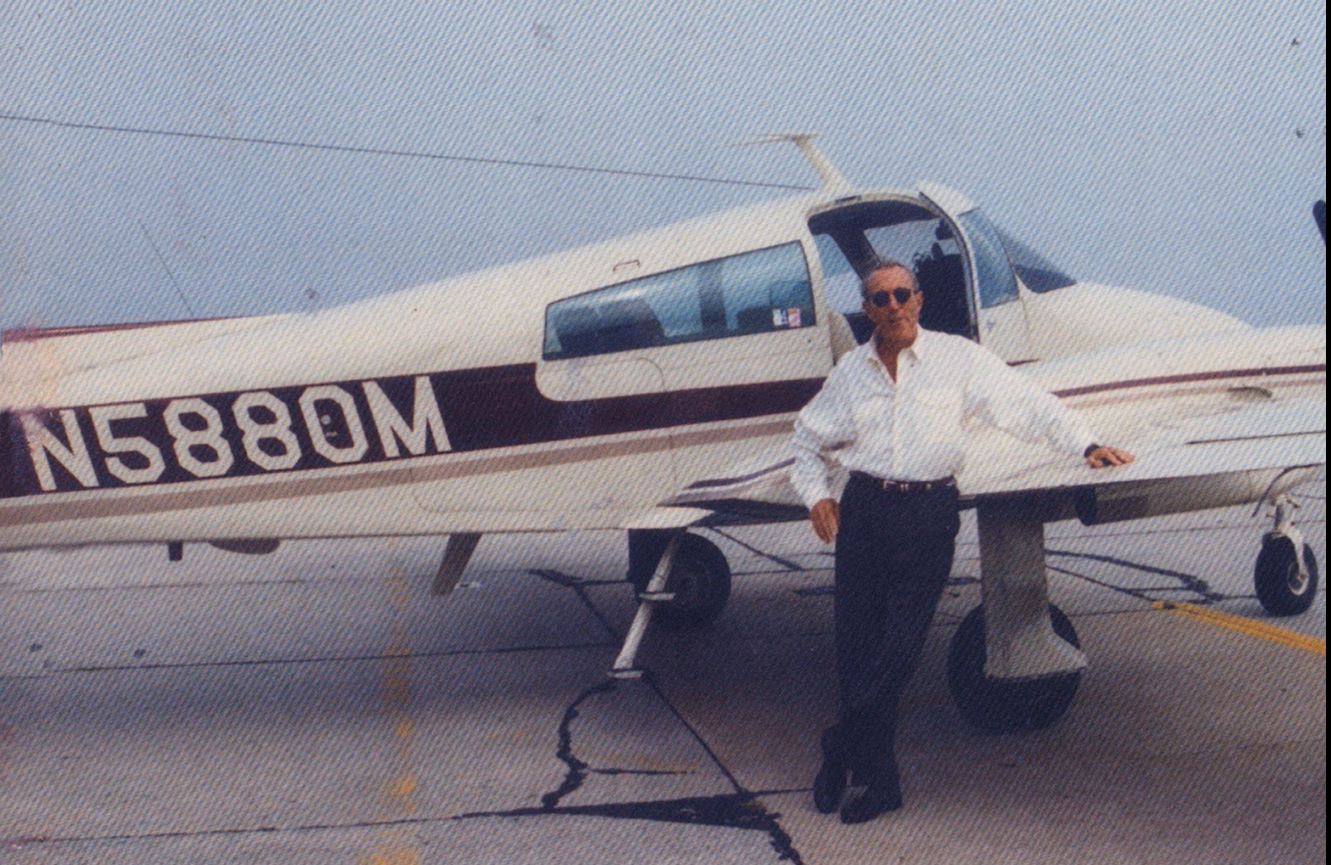
Born in 1939, Paul was an avid sportsman. He loved to ski, sail and fly. His last and most treasured airplane was a Cessna 310. During his time as an active aviator, Paul earned his commercial and ATP certificates, single- and multi-engine and instrument ratings, accumulating 2,446 hours at his retirement from flying in 2001. He knew flight, he understood flight and as a result, took his experience of loss and made it his life’s goal to help others avoid the same tragedy. As of January 2023, Paul has donated nearly one million dollars to support general aviation safety.
In 1997, Paul became one of the first six Hat in the Ring Society members of the then-AOPA Air Safety Foundation. In 2004, the annual philanthropy and safety report said this about Paul:
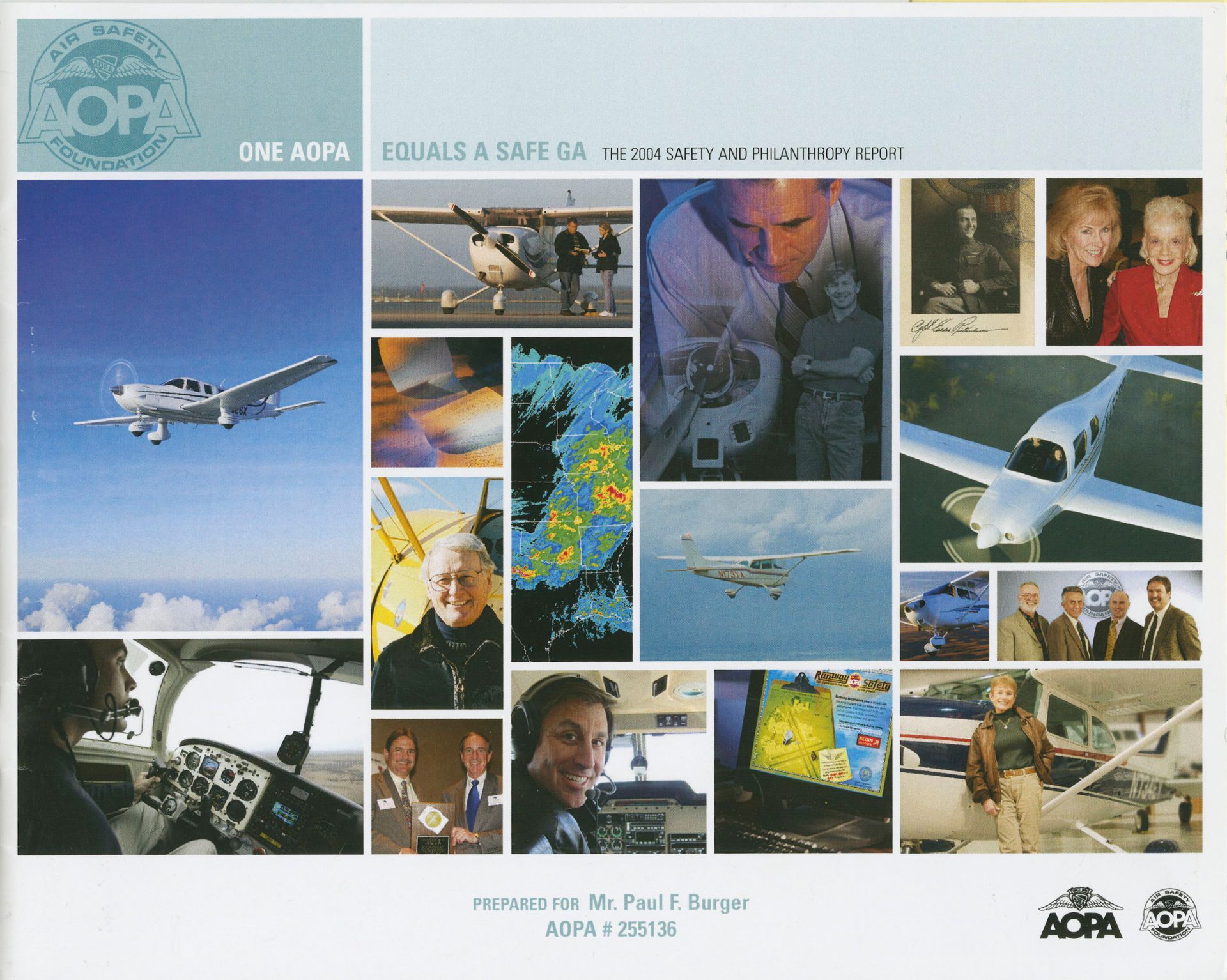
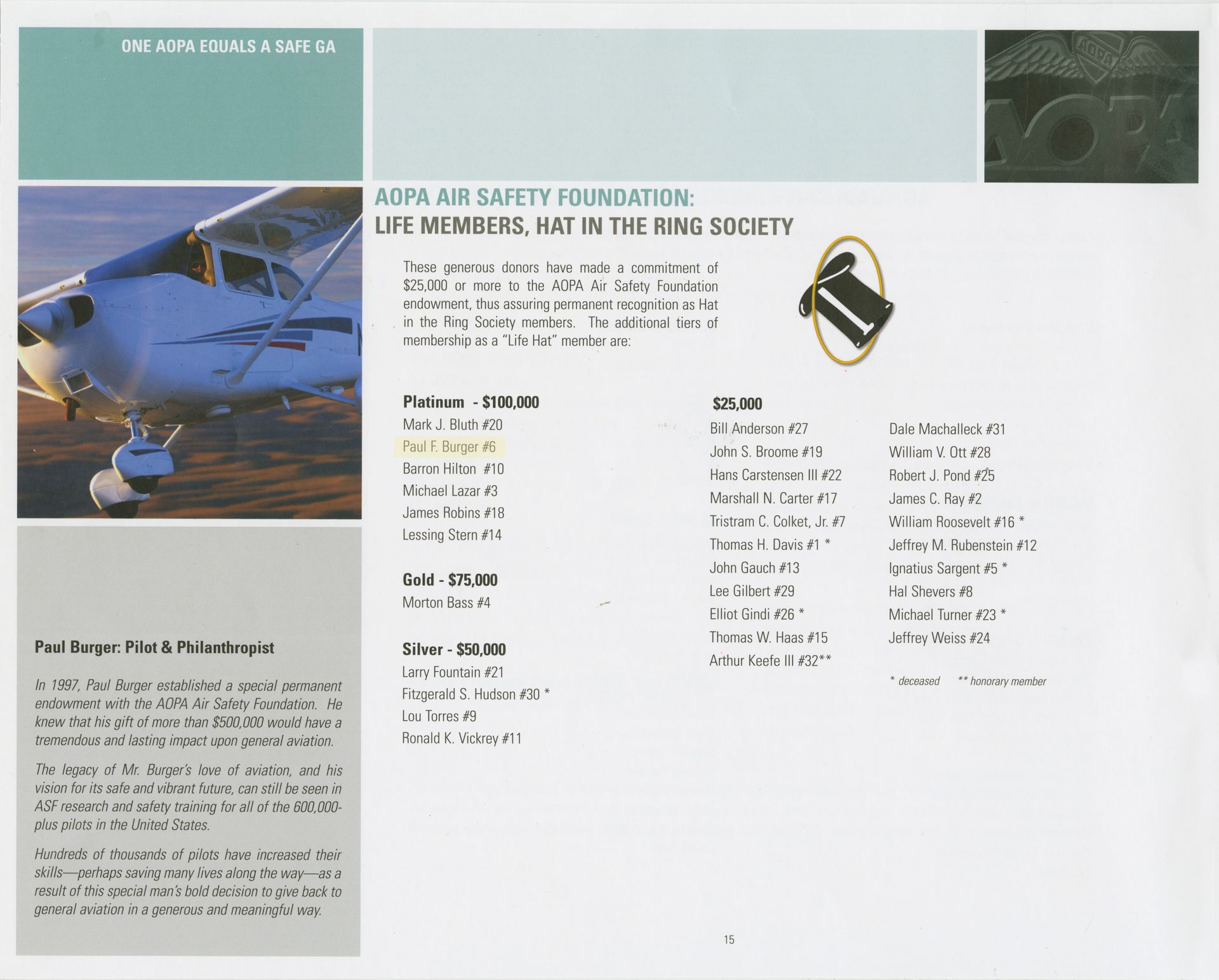
Paul Burger: Pilot and Philanthropist
In 1997 Paul Burger established a special permanent endowment with the AOPA Air Safety Foundation. He knew that his gift of more than $500,000 would have a tremendous and lasting impact upon general aviation.
The legacy of Mr. Burger’s love of aviation, and his vision for its safe and vibrant future, can still be seen in ASF research and safety training for all of the 600,000-plus pilots in the United States.
Hundreds of thousands of pilots have increased their skills – perhaps saving many lives along the way – as a result of this special man’s bold decision to give back to general aviation in a generous and meaningful way.
The report that year was dedicated to Paul along with the many other donors committed to saving lives in general aviation.
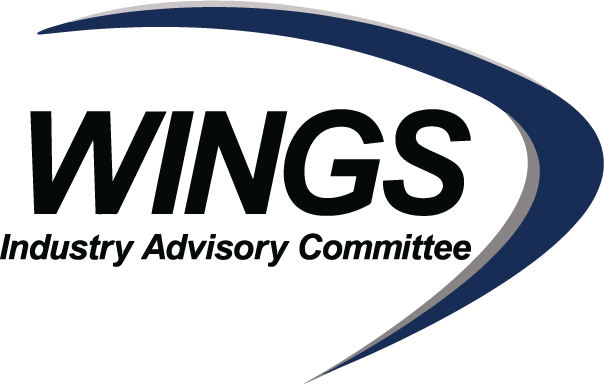
Not stopping there, in 2006 he established the WINGS Industry Advisory Committee. The goal of the committee – to increase awareness of and participation in the FAA Safety Team WINGS Pilot Proficiency Program. Why? Paul was convinced when aviators completed this program, called “phases”, which includes both ground and flight training, they had a substantially reduced likelihood of having accidents. Indeed, the FAASTeam created a report that showed evidence that WINGS pilots were safer pilots. It didn’t take long for the industry and concerned colleagues to agree with Paul. Dozens of industry members, the FAASTeam, friends, and colleagues joined the committee. Despite this success, Paul was not able to convince those with the resources, to invest in improvements to the program. So not much changed after years of meetings, traveling to events, and hundreds of phone calls.
What sets Paul apart as a philanthropist and advocate is more than his generosity, it’s a dogged and relentless determination to accomplish what he sets out to do. He will stop at nothing until he knows that pilots, their families, and friends’ lives are saved because of his work even if it means leaving chaos in his wake. His ability to get his foot in the door almost everywhere is beyond belief. However, he doesn’t always get what he came there for, and in the early 2010s, the WIAC was put on hold.
As always, this setback did not distract Paul from his goal. In early 2014, he contacted a friend and colleague, Lauretta (Godbey) Webb to assist him in taking a new direction, appointing her President of the WIAC. Lauretta launched a Facebook page and held countless meetings with FAASTeam leadership, colleagues, and others to better understand ways to get and keep the attention of stakeholders and successfully gain their support for the long term.
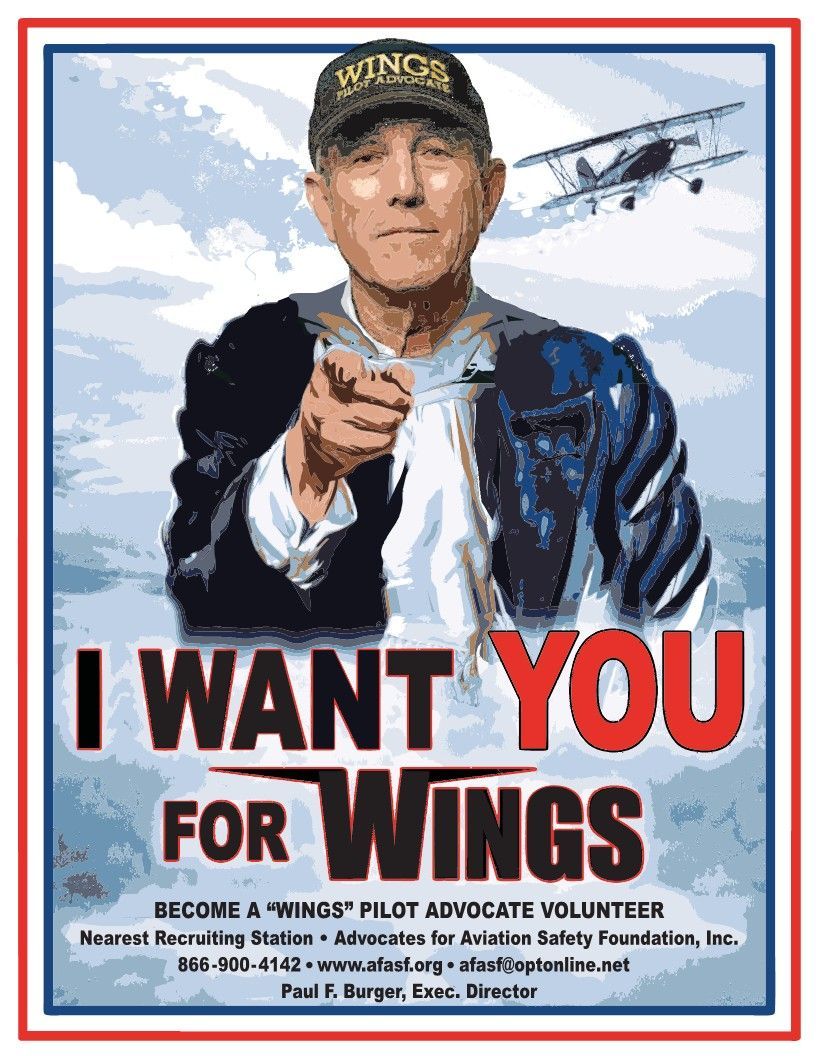
2016 Lauretta joined the National Association of Flight Instructors giving Paul an idea. Paul realized that he needed to set his sights on one key demographic, the flight instructor. After several discussions with NAFI and SAFE leaders, it appeared he might be on to something – offer rewards to CFIs who validate their learners to earn a phase of WINGS. On October 5, 2017, Paul and Lauretta, met in New York City with David St. George, executive director of SAFE, Bob Meder, then chairman of NAFI, and, Richard McSpadden, then executive director of the AOPA Air Safety Institute and everyone supported the idea. 2018 was the first of the five-year campaign, the Paul and Fran Burger $50,000 WINGS sweepstakes.
General Aviation News published an article entitled “Sweepstakes Pays You To Be A Safer Pilot” The article quoted Paul as saying, “It seems that everyone in general aviation knows someone who was killed or injured in an accident. And often the worst accidents were the product of one bad decision or an avoidable situation.”
In an interview for FAASTeam Program Managers, Paul was asked why he started the sweepstakes. Paul responded, "More than 20 years ago I personally witnessed such a tragedy where the pilot, his nephew and niece, and a family friend were killed. As a pilot myself, I know that accident was the result of a clearly avoidable situation.
Since then, I’ve donated a substantial amount of energy, time, and money for GA safety, primarily to the AOPA’s ASI. And I decided not to stop there so last year, my wife Fran and I decided to experiment with a cash incentive concept because we felt that the time was right. Our fondest hope is that it will help to generate excitement around WINGS with the ultimate goal of building awareness and participation in the widely accepted WINGS program.”
The sweepstakes moved Paul back into the spotlight not only because of his generosity but his unique approach to having more “WINGS” pilots and CFIs. The contest offered $10,000 per year for five years. Each year ten lucky pilots and/or CFIs would win cash prizes for earning or validating phases of WINGS.
Because of his tenacity, then President of Hartzell Propeller and longtime sponsor and supporter of the EAA Pilot Proficiency Center at AirVenture each year, Joe Brown, agreed to be the WIAC national sponsor. During the same interview for the FAASTeam FPMs Joe was asked, “…you offered to be the National sponsor of the WIAC. What intrigued you about the [sweepstakes] initiative?”
“It's clever, it’s creative, it’s timely, and it’s bringing people to a lifelong learning attitude toward their flying. But frankly, its origins for me are personal. I got my IFR rating and had 400 hours doing a lot of cross-country long-distance flying and I realized how little I knew. I had a rating and very low proficiency, and I recognized it has to be a lifelong pursuit to have a lifelong learning culture.
And that’s not the GA culture in my opinion. So, the WINGS program, Paul’s vision, Lauretta’s vision, and Richard’s [McSpadden] vision, gets to the question that GA pilots have to think like lifelong learners first and the best way to do that is to put them in an ecosystem in which that changes behavior. What I would say [is that] in the industry the pilot is the most critical resource, and the pilot is the most fragile resource so if you can bring a CFI as a shepherd to a pilot who is in need of constant nurturing and care to get better all the time, then you have the opportunity to make that pilot better and safer. And if you do that you beget more pilots. So, what I love about this sweepstakes is it’s essentially saying ‘Hey, let’s get the CFI and the pilot in an airplane doing continuing education either inside or outside the cockpit.’ And the WINGS program and Richard (AOPA Air Safety Institute) are bringing something to the party worth supporting.”
The sweepstakes, the FAASTeam, the WIAC Committee, supporters, new and old, and others continued successfully reaching more and more aviators to consider the WINGS program as part of their flight training and continuing education. Then in October 2020, Paul reached out to WIAC supporter, John Teipen, Owner, and President of Aeronautic Proficiency Training, two-time National General Aviation Awards honoree, GA safety champion, and professional producer, to create a video for FSANA sponsored by WIAC. That phone call changed the direction of the WIAC into a working organization founded by Paul Burger, Lauretta Webb, John Teipen, and Ron Timmermans, National CFI of the Year and Flight Instructor Hall of Fame inductee. In November 2020, the new organization, the WINGS Industry Network, not only supports the sweepstakes but also engages the industry community to bring a broader message of safety to the aviation community.
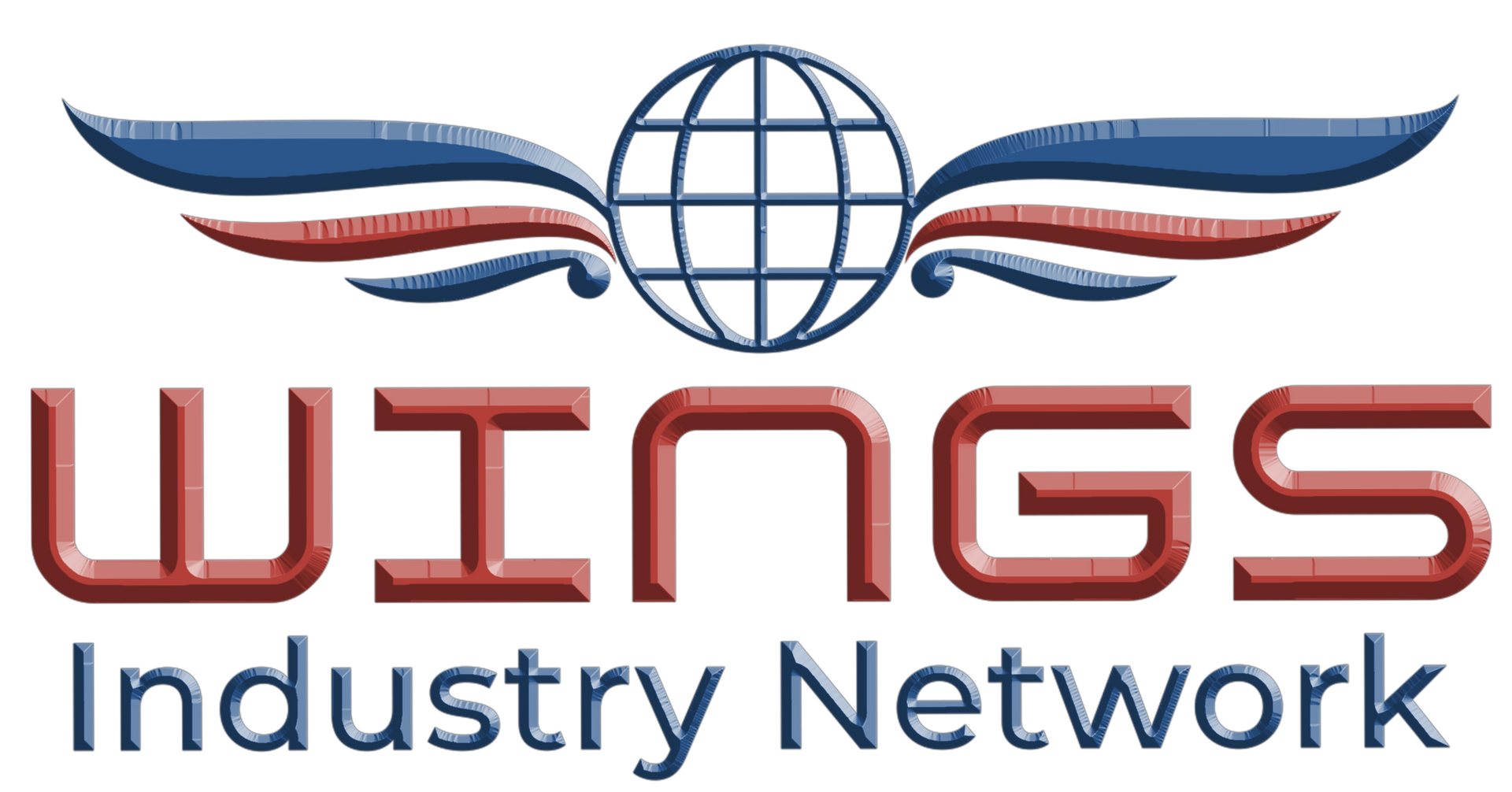
Registering as a nonprofit, 501 c3, a new organization was formed -- the WINGS Industry Network (WIN), starting a new era of safety initiatives.
Working closely with FAASTeam leadership, IT, and course content staff, WIN created E-Z WINGSTM a web-based tool that allows aviators and CFIs direct access to WINGS phase activities making the process far more efficient and accessible. Launched at the 2022 EAA AirVenture show, the program has received tens of thousands of hits by pilots, CFIs, and DPEs. Barring any unanticipated delays, E-Z WINGS will become an app, available in app stores, that will improve efficiency tenfold.
In the meantime, WIN produces live broadcasts spotlighting industry members and their safety initiatives, distributes a newsletter with information from the FAASTeam, Industry members, and WIN directors relevant to national and local safety programs, WINGS / AMT course creation, and more,
None of this would have happened if not for the commitment Paul Burger made the day after that accident to contribute his time and financial resources to assuring fewer people had to experience the loss he, his family, and dear friends did. We honor Paul and his passion for safety and thank him for every minute, every dollar, and every bit of energy he poured into bringing innovative programs to general aviation safety.
Now in his mid-80s, Paul decided it was time to hang up his GA safety hat. He retired from WIN in April 2023. But be sure, he isn’t going away – that’s just not Paul’s style!
For more information on the WINGS Industry Network, visit www.wingsindustry.net.
Paul recently authored the following article. He hopes that all aviators take every word to heart, learn from it, and participate in the FAASTeam WINGS Pilot Proficiency Program.
No, I'm Not OK
By, Paul Burger
Nearly thirty years ago, five people died in a seaplane accident at Block Island, Rhode Island. Two were the adult children of very close family friends. Both recent graduates of Cornell University and in the prime of their lives.
I recently spoke with an official there who had information I hadn’t yet heard. He told me that water landings in either the Old Harbor or the New Harbor on Block Island, RI were not prohibited but neither had a specifically designated landing area. Although this individual I spoke with was not there, he said the incident is still fresh in everyone’s mind.
This is what I knew after the accident: The pilot departed from CT for a short flight to Long Island. He landed successfully on land in Long Island with two passengers. One was his nephew and the other the nephew’s best friend. He refueled and added his niece as the third passenger. They experienced a normal departure and were expected to return directly to CT. But instead, he headed to Block. Several hours after his expected arrival time someone heard a radio broadcast concerning a seaplane accident at Block Island and that’s when my home phone rang.
“Paul, please come over immediately – we just heard about a seaplane accident and are concerned it is ours.”
This is what I recently learned: In December 2023, I spoke to an official on the Island who told me that the pilot made two unsuccessful water landing attempts and did two successful go arounds, returning for a third try. On the third aborted attempt the airplane clipped telephone wires and crashed into a gas station where a woman was refueling her car and became the fifth fatality. So why am I writing about an avoidable situation that happened so long ago? Because I am still not ok.
GA safety is everyone's obligation – that’s why the FAA launched the FAA Safety Team WINGS Pilot Proficiency Program (WINGS). Research indicates that aviators who participate in the program lower their likelihood of an accident or incident.
Capt. Sully Sullenberger, captain flying the airliner in the “Miracle on the Hudson,” made the following comments about WINGS Program:
"I applaud the FAASTeam and its many supporters for encouraging general aviation pilots to seek proficiency training in their flying endeavors through this comprehensive program. Unlike Jeff [Stiles] and myself your passengers are generally your family and friends, giving you an additional incentive to ensure your piloting skills make their flights safe. Earning a WINGS PHASE means proficiency and peace of mind while making you a more informed and safer pilot."
I invested a great deal of my time, energy, and financial support to raise awareness of this program and encourage all aviators to participate. If there is anything I can do to help someone avoid the pain I experienced and continue to experience, it’s worth it. That’s because, I’m not OK.
